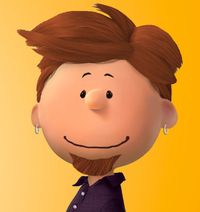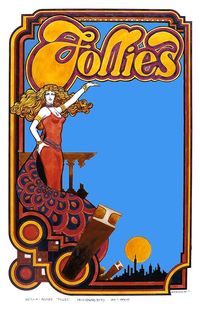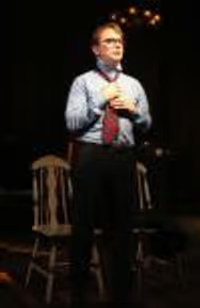My Fair Lady Ending
#25My Fair Lady Ending
Posted: 3/20/18 at 3:01pm
MCfan2 said: "ColorTheHours048 said: "I can’t believe this is still being debated. I understand some of you are romantics, but my God, pick another hill to die on."
You can't believe this is still being debated in the thread that was specifically set up to debate it? ![]() "
"
Yes. It’s a circular conversation of people either bending abusive behavior to fit some romantic mold or giving examples of why an ending tailored to late-50s America doesn’t work for 2018. The ending takes on new meaning as time goes on. Even after reading all these responses, I’m still unclear about what’s so debatable about that.
bk
Broadway Legend Joined: 7/20/03
#26My Fair Lady Ending
Posted: 3/20/18 at 3:20pm
Loopin’theloop said: "bk said: "I think this Higgins as complete monster malarky is a product of now, of today's stuff. No one thought he was a monster when My Fair Lady opened. Oh, some will tell you they did and that would be a boatload of BS. This is all people who can't deal with context, in this case both when My Fair Lady was written, and the era in which it takes place. As I said in the other thread, there's a very easy way to stage the final sequence just as its written by not following the stage directions but by giving your actors something fun to play - it would work perfectly and satisfy everyone. But all this analyzing is strictly from 2018 and I find THAT a bore."
The fact that in 1960s people were more accepting of abuse doesn’t make ok.
Theatre is always seen through the lens of the time in which it is produced. That is no different to the original production of ‘My Fair Lady’. The Shaw ending was changed so that it was more palpable for an audience, hungry for a sentimental musical comedy ending. They chose to go that way, not for arts sake but to be more commercially viable.
You cant do a production of a Shakespeare play, completely untouched by modern ideas and set within its original time frame and hope to give the audience, the same experience as the original audience had. It’s impossible because the plays were written to speak to people of the time. That is why so many productions of Shakespeare’s work are radically adapted, sometimes yes it’s be use directors Luke to be different but the good theatre makers are making these changes so that the play can seem as resonant and immediate now as it was then. The other choice is to allow the play to become a museum piece but that isn’t what they were written for.
The question of the end of ‘My Fair Lady’ is no different. The original ending was written so that it appealed to the audience of the time but by leaving it as it is, you cannot hope to do the same in 2018. The authors intent was to have the ending give the audience what they want, you cannot honour that intent by leaving the work unmoved by the time. If the show was written, purely as aperiod piece with no condensations made for a 60s audience, then the show should be left alone but it want.
So the choice is, leave it as a period piece or try and give yourself present day audience the experience the original production gave its audiences. And to do that, you take the same steps Alan Jay Lerner and the his collaborators took back then.
Everything you post involves some degree of self praise. You did the album better. You know how to direct young people. You directed a college production that didn’t make any changes to the text and everyone thought it was wonderful. Either you have no self awareness or you don’t care that people know your actual identity and how much of a conceited, if faded would be A list player you are. If you have an idea that makes the ending work, then why are you repeatedly mentioning it without actually saying what it is?"
You almost got away with this until you started making with the insults and made your intentions clear. You have obviously been following all my posts here so one immediately has one's suspicions, oh, yes, one has one's suspicions because tone and style are so very hard to disguise. BTW, My Fair Lady wasn't written in the 1960s so your theatre history is as interesting as your insults - it tells everyone everything they need to know about you. And My Fair Lady IS a period piece both in its writing and the time in which it is set. Good try, though.
Loopin’theloop
Leading Actor Joined: 1/9/18
#27My Fair Lady Ending
Posted: 3/20/18 at 4:12pmCourse I’ve seen your posts. I read the message board.
#28My Fair Lady Ending
Posted: 3/20/18 at 6:33pm
I think either ending works. It depends on the chemistry of the leads. The chemistry between Audrey Hepburn and Rex Harrison was rather awkward and chilly and so for me the moving ending felt forced. The chemistry between Wendy Hiller and Leslie Howard was much more present so the ending made sense.
BUT ... and tis is important ... I don't think GB Shaw ever meant to say that Eliza and Henry do not have feelings for each other. They clearly do. Those feelings aren't necessarily romantic though. People can get their feelings deeply hurt but not necessarily in a romantic way.
I mean look at this. Isiah Thomas and Magic Johnson.
https://www.youtube.com/watch?v=cSuGyO1E8HE&t=1s
I don't think Magic and Isiah are lovers or were lovers. But clearly their estrangement was very painful for both of them and their reconciliation brought out a lot of emotions. Doesn't mean they were f__king.
#29My Fair Lady Ending
Posted: 3/20/18 at 8:27pm
To those who’ve seen it already ... which aisle does “the exit” use?
Seating Chart
#30My Fair Lady Ending
Posted: 3/20/18 at 8:37pm
CurtainPullDowner said:
I wonder if they got permission to change it?"
LOL, this is a Broadway revival, not your high school or your community theater
JIMG3
Featured Actor Joined: 5/18/16
#32My Fair Lady Ending
Posted: 3/21/18 at 12:05amShe exits through the 200 high - 100 low aisle. As of today, tickets are being sold through January 6th!!
#33My Fair Lady Ending
Posted: 3/21/18 at 12:41am
I let my LCT membership lapse after that DREADFUL production of THE KING AND I, and I don't regret the decision. I wondered about MY FAIR LADY, but now I think that a trip to the Beaumont would be a waste of time and money. I don't think I would be seeing MY FAIR LADY- not this time around. My first theatrical memory was seeing the National Company of the show in 1963, and the memory is still vivid. Something tells me this will merely be, as a friend of mine likes to say, "this year's" MY FAIR LADY.
#34My Fair Lady Ending
Posted: 3/21/18 at 6:11am^Be careful there oldbill, I thought this was an A8 posting!
#35My Fair Lady Ending
Posted: 3/21/18 at 11:06amWhat does your dislike for a production you haven’t even seen have to do with the show’s ending?
After Eight
Broadway Legend Joined: 6/5/09
#36My Fair Lady Ending
Posted: 3/21/18 at 12:10pm
Justoldbill wrote:
" My first theatrical memory was seeing the National Company of the show in 1963, and the memory is still vivid. "
That's good. Keep it and cherish it. It may be all you have to hold on to from here on in. If one good thing comes out of this whole unfortunate enterprise, it's that it will make us treasure our memories all the more.
"Something tells me this will merely be, as a friend of mine likes to say, "this year's" MY FAIR LADY."
Your friend is right, and so are you.
#37My Fair Lady Ending
Posted: 3/22/18 at 2:36pmI should make a correction for a reply I gave earlier. I mentioned that some people reported thinking Higgins was just imagining Eliza's return at the end, but someone who spoke to Sher after one of the preview performances stated that the intention was for Eliza to come back physically to say goodbye and then leave him. It's a softer ending than we got with Shaw, but still true to the relative idea of Henry and Eliza not working together.
ScottyDoesn'tKnow2
Broadway Legend Joined: 1/22/14
#38My Fair Lady Ending
Posted: 3/22/18 at 2:47pm
The way Sher directed Hadden-Paton and Ambrose throughout the production, the ending with Eliza coming back and seeing Henry one more time to see if it could work out and him reacting that way and her being more sentimental and sad about it than anything (as if she expected it) and then brushing his face and then leaving while he looks on almost helplessly when she goes due to how he is really makes sense with this production. I overheard some people around me, who were closer to my age, really loving that ending with one woman going "I was like, 'yes! go girl!'" really said why Sher decided to go with that ending.
There's clearly some sort of love between the two and some complicated feelings but Eliza decides that that in of itself is simply not good enough for her to stay.
After Eight
Broadway Legend Joined: 6/5/09
#39My Fair Lady Ending
Posted: 3/22/18 at 6:40pm
"I overheard some people around me, who were closer to my age, really loving that ending with one woman going "I was like, 'yes! go girl!'" really said why Sher decided to go with that ending."
Thank you for relating the elegantly-phrased reaction of this theatre connoisseur. Doubtless she knows all about My Fair Lady, Shaw, and everything ever written for the stage.
So good to know that this is the audience the director has torpedoed this work for.
JIMG3
Featured Actor Joined: 5/18/16
#40My Fair Lady Ending
Posted: 3/22/18 at 7:14pm
After Eight said: ""I overheard some people around me, who were closer to my age, really loving that ending with one woman going "I was like, 'yes! go girl!'" really said why Sher decided to go with that ending."
Thank you for relatingthe elegantly-phrasedreaction of this theatre connoisseur. Doubtless she knows all about My Fair Lady, Shaw, and everything ever written for the stage.
So good to know that this is the audience the director has torpedoed this work for."
The question remains: where was she “going”?
After Eight
Broadway Legend Joined: 6/5/09
#41My Fair Lady Ending
Posted: 3/22/18 at 7:25pm
"The question remains: where was she “going”?"
Best ask the erudite who cheered her on. She's doubtless a seer as well as a sage.
A more important question is where our theatre is going. Given the effusive praise being lavished on this travesty, I know the answer to that one: to hell in a handbasket.
ScottyDoesn'tKnow2
Broadway Legend Joined: 1/22/14
After Eight
Broadway Legend Joined: 6/5/09
#43My Fair Lady Ending
Posted: 3/22/18 at 8:00pm
^
Just calling it like it is.
Our theatre would be better off if others did the same.
#44My Fair Lady Ending
Posted: 3/22/18 at 8:18pm
I saw the ending yesterday. I actually thought it was MORE romantic than the Lerner and Loewe ending. She goes up to him, touches his cheek and holds his hand. Lauren Ambrose's body language is visibly crestfallen. She leaves, but it's clear she still loves him. It's not clear at all whether she'll be any happier with Freddy as I thought in the scenes where she returns to Covent Garden Freddy just didn't understand much about her.
So this love found and lost ending IMO makes it more romantic. Sort of like Casablanca or any other tearjerker where the couple are separated by choice but not because they didn't love each other.
#45My Fair Lady Ending
Posted: 3/22/18 at 8:20pm
"Our theatre would be better off if others did the same."
Our theatre will be better off when you choke on one of the dust-coated stuck-together molasses candies you doubtlessly keep in a glass bowl on top of a moth-eaten doily.
After Eight
Broadway Legend Joined: 6/5/09
#46My Fair Lady Ending
Posted: 3/22/18 at 8:57pm
"I saw the ending yesterday. I actually thought it was MORE romantic than the Lerner and Loewe ending."
Whether you found it more, equally, or less romantic than the Lerner and Loewe ending is beside the point. It is not the Lerner and Loewe ending. They've sold tickets to the Lerner and Loewe musical entitled My Fair Lady, with the expectation inherent in that title being the ending Lerner and Loewe wrote, intended, and presented on stage.
That may not matter to some; it certainly matters to me.
#47My Fair Lady Ending
Posted: 3/22/18 at 9:33pmAnd Lerner and Loewe sold tickets to an adaptation of Shaw's Pygmalion, which this ending sounds closer to.
#48My Fair Lady Ending
Posted: 3/22/18 at 9:35pm
I can't wait for the Sher version of You're a Good Man, Charlie Brown. Lucy will come out at the end to finally validate Charlie, but instead she just strokes his face and exits.
And the Sher Peter Pan, where Tinkerbell doesn't rise from the dead.
And the Sher Wicked, which breaks the mold by having the Wizard change his mind, call off the witch hunt, and everyone twerks happily at the finale.
(Would it be too dark of an ending to RENT if Mimi comes back to life... but clearly being used as a meat-puppet by the soul of a recently deceased Angel?)
After Eight
Broadway Legend Joined: 6/5/09
Videos











